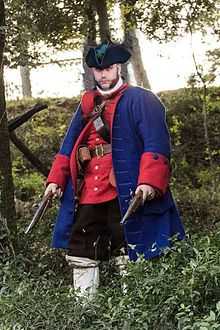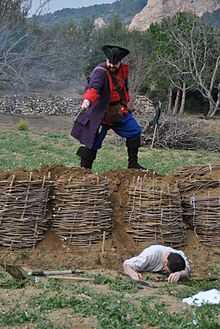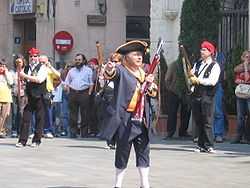Miquelet (militia)

Miquelets or Micalets (Catalan pronunciation: [mikəˈɫɛts] Western Catalan: [mikaˈlets]; Spanish: Migueletes) were irregular Catalan and Valencian militia. They enjoyed a certain prominence in the wars of Spain during the 17th and 18th centuries, and in peace seem to have plundered travellers.[1]
Overview
The name is a diminutive of Michael; it is claimed it comes from Miquel or Miquelot de Prats, a Catalan mercenary captain in the service of Cesare Borgia.[1] The term was used for many unconnected groups of Catalans who took up arms in many wars, as well as in banditry.[1][2] The Miquelets were maintained at the parish level, not by the central or the provincial governments, and as they had to turn out for duty on sound of the village alarm-bell (someten) they are frequently called somatenes.[1]
In specific wars


The Miquelets were active during the Catalan secessionist revolt of 1640 (Catalan: Guerra dels Segadors, "War of the Reapers")
In the War of the Spanish Succession (1701–1714), the Miquelets continued the struggle against the French claimant Philip, Duke of Anjou (Philip V) until long after the peace.[1]
During the Peninsular War, the Miquelets successfully harassed the French occupiers in the mountains of Catalonia, sometimes even participating in operations in large bodies, such as in the Siege of Gerona (1809) and other operations around Girona in 1808 and 1809.[1]
Miquelet was a sobriquet used by Catalan soldiers on both sides of these and other wars; the French raised Catalan troops in 1689 in the Revolt of the Barretines, as well as in 1808 in the Peninsular War.
Miquelets in the Americas
Regiments of Miquelets were also integrated in the Spanish army and fought in other places of the Spanish Empire, outside Spain. For example, the First Free Company of Volunteers of Catalonia, which was composed of Catalan Miquelets, was destined in New Spain. From there, the Company played a crucial role in the Spanish colonization of the Pacific Northwest, building Fort San Miguel, the first formal European settlement in British Columbia, from 1790 to 1792. Its captain, Pere d'Alberní i Teixidor, received military decorations and even was appointed Interim Governor of California in 1800.

Other uses
The police forces of the autonomous governments of Biscay (1784–1877) and Gipuzkoa (1796–1936) were known as Miqueletes.[3]
See also
- Battle of Montjuïc (1641)
- Battle of Cambrils
- Guerrilla warfare in the Peninsular War
- History of Catalonia
- Free Company of Volunteers of Catalonia
Notes
- ↑ 1.0 1.1 1.2 1.3 1.4 1.5 Chisholm 1911, p. 566.
- ↑ Dictionnaire de l'Académie française, 5th Edition, 1798: Miquelet. sm Il se dit d'une sorte de bandits qui vivent dans les Pyrénées. Les Miquelets sont fort à craindre pour les voyageurs. ("Miquelet. A type of bandit who lives in the Pyrenees. The Miquelets are strongly to be feared by travellers."
- ↑ Diez de Salazar, Luis Miguel. "Miquelete". Auñamendi Entziklopedia. Eusko Media Fundazioa. Retrieved 2014-04-15.
References
- Dictionnaire de l'Académie française (5th ed.), 1798
- Attribution
![]() This article incorporates text from a publication now in the public domain: Chisholm, Hugh, ed. (1911). "Miquelets". Encyclopædia Britannica 18 (11th ed.). Cambridge University Press. p. 566.
This article incorporates text from a publication now in the public domain: Chisholm, Hugh, ed. (1911). "Miquelets". Encyclopædia Britannica 18 (11th ed.). Cambridge University Press. p. 566.